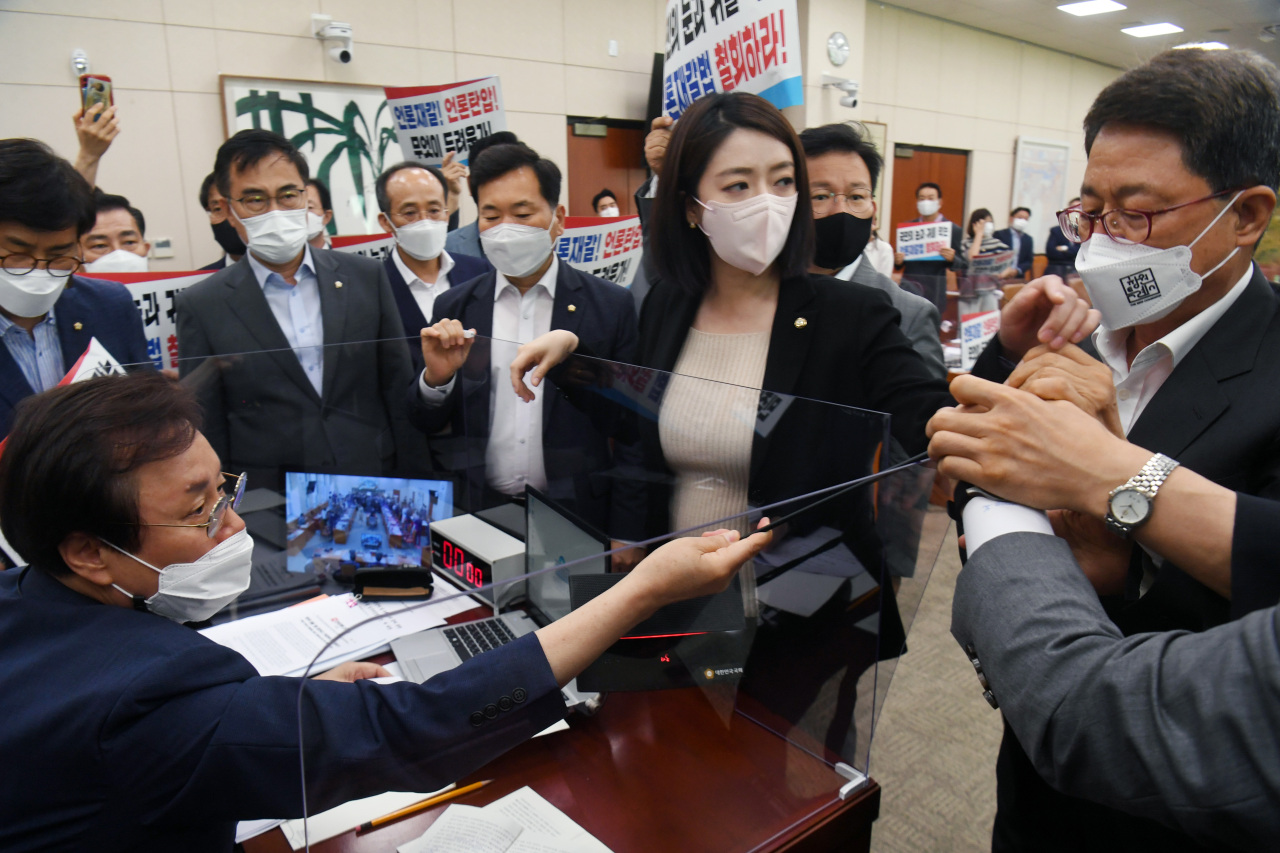 |
Lawmakers of the main opposition People Power Party storm the podium of Do Jong-hwan, chief of the culture, sports and tourism committee, during the committee's plenary meeting at the National Assembly in Seoul last Thursday, as they attempt to foil the ruling Democratic Party's push to enact a media arbitration bill that critics say will threaten people's right to know and discourage the press's checks on power. (Yonhap) |
A partisan showdown loomed large at the National Assembly on Monday, as the ruling Democratic Party (DP) with a controlling number of parliamentary seats was set to railroad a controversial media bill this week fiercely contested by opposition parties and media industry trade groups.
The revision of the Act on Press Arbitration and Remedies, Etc.
for Damage Caused by Press Reports, which was passed by parliament's culture committee last week, is expected to be put to a final vote during the National Assembly's plenary session Wednesday.
The DP, which holds an absolute parliamentary majority, is predicted to unilaterally pass the bill during the session.
Spearheaded by the DP as part of its broader vision to "reform" the media, the bill aims to sharply increase the media's responsibility for false and fake news.
The revision proposal primarily aims to multiply the level of punitive compensation rates for damage from the release of "deliberate" or "grossly negligent" false news reports by up to fivefold in a bid to curb the dissemination of misleading news.
It will also require media outlets responsible for such news to publish corrections or eliminate problematic reports from news services.
The bill, however, is running into fierce resistance from opposition parties and media organizations, which denounce it as an attempt to gag media outlets critical of the government and the ruling party ahead of next year's presidential election.
The DP counters that argument, citing the exclusion of elected public officials and large conglomerates from being able to seek damage through the new bill.
"It's hard to comprehend the revision being criticized as a press-gagging bill when those with economic and political powers are excluded," DP Chairman Rep. Song Young-gil said last week.
Song added, "This bill is essentially a damage relief bill for the people who have suffered losses from the press with an enormous amount of social influence."
The main opposition People Power Party, the minor Justice Party and media groups, such as the National Union of Media Workers and the Journalists Association of Korea, have engaged in campaigns against the revision attempt over what they perceive as likely a chilling effect on aggressive reporting and news gathering on the powers that be.
Opponents also point out the conspicuous exclusion of YouTube, often cited as a major source of conspiratorial fake news, from the revision. Some even argue that the DP's legislative effort is essentially aimed at preventing any recurrence of the so-called Cho Kuk crisis, referring to the concentrated media reporting that led to the resignation of former Justice Minister Cho Kuk in 2019.
Others also claim that the media bill would effectively discourage journalists from engaging in critical and hard-line reporting, questioning whether the late 2016-early 2017 corruption scandal surrounding former President Park Geun-hye and her longtime confidant, Choi Soon-sil, would have ever been brought to light under toughened penalties, as Choi never served in public office.
"The media bill is an attempt to silence, annihilate and control the media. We ask the people to muster up and collect the strength in order to prevent the passage of such a bad law," PPP Chairman Lee Jun-seok said last week.
Amid the looming plenary vote, the debate has also come into the center stage of presidential politics, with key players exerting their voices on the controversial media bill.
Former Prosecutor General Yoon Seok-youl, the PPP's leading opposition presidential contender, on Sunday held a press conference blasting the media bill, calling it an attempt by the ruling party to "extend its ruling by silencing reporting critical toward the administration nearing its end."
Rep. Lee Nak-yon, former DP chairman competing in the party's presidential primary, expressed support toward tougher penalties, saying, "Damage and defamation incurred due to fake news produced intentionally or by negligence of the media can never be fully healed." (Yonhap)








![[Weekender] Korea's traditional sauce culture gains global recognition](http://res.heraldm.com/phpwas/restmb_idxmake.php?idx=644&simg=/content/image/2024/11/21/20241121050153_0.jpg)